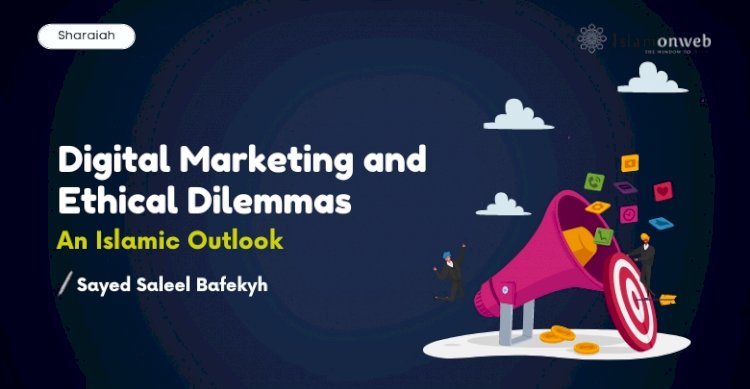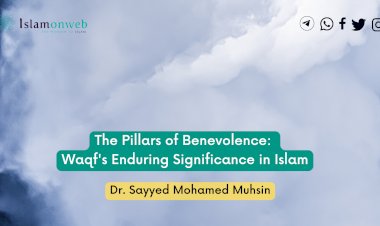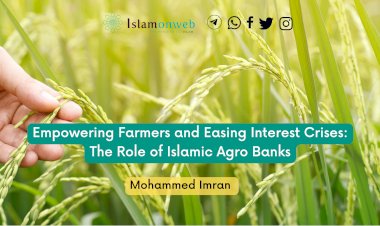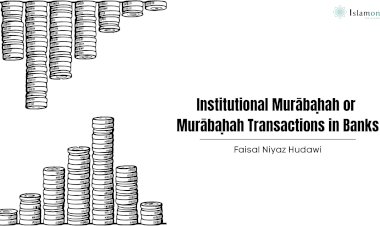Digital Marketing and Ethical Dilemmas: An Islamic Outlook
“By Allah, it is not poverty that I fear for you, but rather I fear you will be given the wealth of the world, just as it was given to those before you. You will compete for it just as they competed for it, and it will ruin you just as it ruined them.” Prophet Muhammed (peace be upon him)
“If you don’t find a way to make money while you sleep, you will work until the day you die.” Warren Buffett
Digital marketing, according to Dr. Mrs. Vaibhava Desai, is defined as "the marketing of products or services using digital technologies." This definition seems straightforward and simple, not particularly thought-provoking. However, upon deeper reflection on the underlying philosophies of marketing, one finds minds focused on maximizing profits often at the expense of ethics. In this light, digital marketing becomes a pertinent topic for discussion and resolution, particularly concerning its alignment with Islamic principles guiding lifestyle and earning.
Linking back to the aforementioned Prophetic tradition, we may deduce that the Prophet (peace be upon him) discourages excessive wealth accumulation. This conclusion is supported by additional Prophetic statements such as: "Verily, every Ummah has a fitnah, and the fitnah of my Ummah is wealth," "The poor Muslims will enter Paradise before the rich by half of a day, the length of which is equivalent to five hundred years in the earthly realm," and "If Adam's son (human) had a valley full of gold, he would like to have two valleys, for nothing fills his mouth except dust (meaning: his greed will not be satisfied until he dies). And Allah forgives him who repents to Him."
This deduction is further solidified and fortified by expressions such as "al Faqru Fakhri" (poverty is my pride) and the supplication "Oh Allah! Cause me to live poor and cause me to die poor, and gather me among the poor on the Day of Resurrection." However, it's important to note that these expressions have been deemed "baseless; a fabrication" (as stated by Hafiz Ibn Hajar) and "strange" (as explained by Al-Tirmidhi). Even if these Hadith are supposedly Sahih, it leads to a series of queries regarding the intricacies and hermeneutical nuances of the concept of "Faqr" in the context of Prophetic life, which lies beyond the scope of this article. The conclusion drawn is that "Faqr" in this context likely indicates spiritual poverty, signifying a constant reliance on Allah, seeking, begging, and confiding in Him out of love, rather than being concerned with material gains.
In reality, wealth-generation is part of an important pillar of Islam, to rephrase the idea in prophet’s own words:
"بُنِيَ الْإِسْلَامُ عَلَى خَمْسٍ: شَهَادَةِ أَنْ لَا إلَهَ إلَّا اللَّهُ وَأَنَّ مُحَمَّدًا رَسُولُ اللَّهِ، وَإِقَامِ الصَّلَاةِ، وَإِيتَاءِ الزَّكَاةِ، وَحَجِّ الْبَيْتِ، وَصَوْمِ رَمَضَانَ"
“Islam has been built upon five: testifying that there is no deity worthy of worship except Allah and that Muhammad is the Messenger of Allah, establishing the salah (prayer), paying the zakat (obligatory charity), making the hajj (pilgrimage) to the House, and fasting in Ramadhan”
Throughout the Holy Qur’an, Almighty Allah orders us to pay Zakat (73:20, 58:13, 41:7, 9:60). Besides Zakat, there are also other forms of charitable acts such as Sadaqah (voluntary charity), Hadiyah (gift), and Qarz (loan). These monetary transactions, which are promoted and encouraged by the Almighty Lord and His Messenger (peace be upon him), cannot exist without wealth generation.
To provide perspective, in Islam, wealth generation is deemed equally important as attaining knowledge. The Messenger (peace be upon him) emphasizes this by stating: "There is no envy except in two: a person to whom God has given wealth and he spends it in the right way, and a person to whom Allah has given wisdom and he acts upon it and teaches it to others."
According to Islamic Jurisprudence, Zira’ah (cultivation), which can now be broadened to include the scope of manufacturing or production, is considered the best livelihood one could have, followed by Tijarah (trading). From these Quranic and prophetic traditions, it is evident that Islam does not have an issue with wealth generation nor does it impose a limit on it. The primary concern of Islam lies in how the money is earned and spent, emphasizing ethical considerations in both acquisition and expenditure.
Returning to the quote by Warren Buffett, the notion of dedicating one's life to personal and societal advancement is often viewed negatively unless significant wealth is attained in the process. Essentially, the prevailing sentiment suggests that life is deemed wasteful if one does not achieve wealth, freedom, and the ability to enjoy life. In today's digital age, self-proclaimed "financial gurus" and online "experts" are proliferating across the internet, offering advice on how to become rich quickly, adopt a "rich mindset," attain wealth effortlessly, and even advocate for being lazy yet rich.
The point being highlighted is that people are increasingly impatient and eager to become wealthy, often at the expense of sacrificing their values. Since the beginning of the twenty-first century, new models of wealth generation have been continuously promoted through mainstream and social media platforms. These models typically promise substantial returns with minimal effort. Examples include the dotcom boom, real estate brokerage, YouTube automation, MLM-based apps, cryptocurrency, NFTs, SaaS (Software as a Service), drop-shipping, custom AIs, and various other trends that have emerged in recent years.
Indeed, the lifeblood of all these business and wealth-generation models lies in marketing, particularly digital marketing, which enables proprietors to attract customers and generate profit. However, from this standpoint, it becomes evident that those employing multifaceted tactics of digital marketing are primarily motivated by increasing their net profit. Unfortunately, this often translates to a high disregard for ethics and morals, as they utilize every trick in the book to manipulate the consumer base and exploit them outrightly in order to extract money from them.
Having a basic understanding of the methods and tactics of digital marketing is essential for better analyzing the ethical perspective of the matter at hand. Various techniques fall under the umbrella of e-commerce marketing, including:
- Search Engine Optimization (SEO)
- Social Media Marketing
- Content Marketing
- Affiliate Marketing
- Native Advertising
- Marketing Automation
- Pay-per-Click (PPC)
- Email Marketing
- Search Engine Marketing (SEM)
- Display Advertising
- Retargeting/Remarketing
- Influencer Marketing
- Inbound Marketing
- Online PR
- Business-to-Business (B2B) Marketing
- Business-to-Customer (B2C) Marketing
- Website Traffic Generation
- Attribution Modeling
- Online Behavioral Advertising
- Collaborative Environment
- Data-Driven Advertising
- In-game Advertising
- Gamification of Marketing
Indeed, these strategies serve as tools to enhance business enterprises and increase brand value, potentially attracting affluent customers and elevating the business to a premium or luxury brand status. However, in practice, they are often responsible for causing havoc in the lives of middle and lower-class individuals due to the employment of "dirty tricks" that exploit consumer weaknesses or manipulate emotions. The ethical concerns surrounding digital marketing primarily revolve around the content of the marketing and the methods employed to circulate it. It's crucial to evaluate how these tactics impact individuals and society as a whole, and to address any unethical practices accordingly.
The major ethical issues observed in e-commerce marketing encompass a wide range of problematic behaviors, including:
- Obfuscation of product information
- Evasive presentation
- Deceptive advertisement
- Overpromising
- Amplifying expectations and hyping
- Cultural appropriation
- Insensitive projection
- Comparative advertisement (trash-talking)
- Intrusive marketing
- Mishandling personal data
- Predatory marketing
- Polarization of communities
- Fear appeal
- Market segmentation
- Objectification of women
Indeed, Islam has no inherent issue with wealth generation, but it places significant emphasis on the means and methods by which it is attained. Islam provides inviolable and sacrosanct boundaries, serving as guidelines to foster healthy, long-lasting, and rewarding enterprises in both worldly and spiritual realms. Moreover, Islam emphasizes the importance of upholding ethical principles, including trust, integrity, and honesty, in all business endeavors, including marketing practices.
Islamic teachings instruct believers to prioritize spiritual obligations over worldly pursuits, such as refraining from business transactions during the Friday congregational prayer (Jumah). The Quran also advises against conducting business in places of worship, and Prophet Muhammad (peace be upon him) discouraged commercial activities in mosques, instructing companions to invoke blessings upon those engaged in such transactions. This underscores the importance of maintaining sanctity in places of worship and upholding ethical standards in all aspects of life, including business and commerce.
The books of Mu’amalat in the discipline of Fiqh prohibit certain types of business practices within the Muslim Ummah, such as monopoly business (where supply of a certain product or products is concentrated in one hand to exploit the customer base), speculative and interest-based businesses, Mozabana, Mu’awama, Bai’ al Gharar, Bai’ al Uryan, and Bai’ al Mudtar. While these traditional prohibitions may not directly mirror the emerging modes of entrepreneurship, especially those online, the reasons and spirit behind the prohibitions remain compatible and applicable to the new models of businesses.
In the realm of marketing, the hadith concerning bai’ al gharar or al ghash (sale by deception) provides foundational guidelines. The qualities that deter a person or entity from committing gharar are honesty, integrity, and trust. As discussed, attaining these qualities resolves major ethical issues faced by today's marketing practices. Specifically, possessing these qualities can transform digital marketing from dishonest advertising to honest promotion, from mishandling data to responsible data management, from disregarding privacy to respecting it, from unfair market segmentation to promoting fair competition, from obfuscated information to transparent and clear communication, and from exaggerated to accurate marketing.
In conclusion, the underlying philosophy of modern business often views wealth as something to be acquired and spent as the achiever pleases, with little consideration for ethical or moral implications. However, Islam perceives wealth as a responsibility and Amanah from Allah (SWT). It cannot be acquired unlawfully nor spent frivolously. Islam does not discourage active and enthusiastic business endeavors employing marketing strategies to maximize profit; rather, it encourages individuals to be the "upper hand," strong Muslims, rather than being the lower and weak Muslims. Islam seeks to protect individuals from becoming heartless, cold money-making machines, emphasizing empathy, contribution, and responsible citizenship instead.
Major References
1- Sahih al bukhari, 3158
2- Sunan al tirmidhi, 2336
3- Sunan al tirmidhi, 2354
4- Sahih al Bukhari, 6439
5- Warren Buffett, The Essays by Warren Buffett: Lessons for Corporate America
6- Ozlin Karemen,(2023) Ethics of Digital Marketing,, Research gate.
7- Bennet Samuel,(2023) Role of Ethics in Online Marketing, Research gate
8- Eagle, Dahl,(2015), Marketing Ethics & Society,
9- Muhammad Riaz,(2016) Islamic Marketing Ethics and the Marketing Practices of Islamic Banks, International Journal of Islamic Ethics
10- Saeed, M., Ahmed, Z. U., & Mukhtar, S. (2001). International Marketing Ethics from An Islamic Perspective: A Value-Maximization Approach. Journal of Business Ethics
11- Eko Pujianto, Muzdalifa, (2022), Digital marketing in Islamic perspective: A literature review, Research gate.
12-Ahmed Salim Al Rawas, Issa Khan, Ilhaamie Abdul Ghani Azmi,(2023) E-Marketing From An Islamic Perspective And Its Impact On The Performance Of Small And Medium Enterprises, Al Qanatir, International Journal of Islamic Studies.
13- Golam Mohiuddin1, Shariful Haque (2013), Marketing Ethics in Islam: A Model Based Theoretical Study, Scientific and Academic Publishing
About the author
Sayed Saleel Bafekyh is currently pursuing an MSc in Marketing at the International Islamic University Malaysia. He earned his BCom degree from the University of Calicut, India. His areas of expertise and interest include Islamic Ethics in Marketing, Financial Philosophy, and Digital Marketing.
Disclaimer
The views expressed in this article are the author’s own and do not necessarily mirror Islamonweb’s editorial stance.
























Leave A Comment